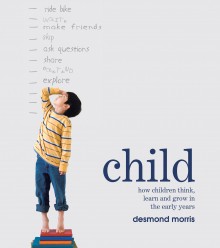Every age and stage of childhood has its challenges, and in the murky midst of a toddler tantrum, you might not think that your next move should be to head to the shops and buy this book. However, that might just be the best move you could make.
A zoologist with something like 80 published books to his name, author Desmond Morris is an expert on how animals behave – and we humans, of course, are part of that animal kingdom.
With this book, Morris considers hundreds of developmental milestones that occur for children between the ages of two and five, observing the physical, cerebral, and emotional journeys that children are making in the process of developing a pretty comprehensive range of new skills – from walking, writing, collecting and sorting to counting, pulling faces, riding a bike, sharing and imagining.
An exceptional tome about childhood that is jam-packed with brilliant scientific insights and written in a delightfully warm and accessible manner, Child is not about parenting, yet is one of the best parenting reference books we have ever seen
With each of his extremely readable expert insights, parents quickly comprehend the whys and wherefores of children’s behaviour during each of these phases. There are no recommendations here on how to parent, simply observations that deliver insights into the nature of the struggles and thrills that children encounter at this stage on their lifetime journey. By simply understanding what is going on for your child, you will discover new ways of dealing with those magical mystical childhood moments when your child’s behaviour seems to make no sense at all!
What We Love The beautiful double page spreads that showcase each skill. With only 300-400 words outlining each, it is a beautiful approach to the science of development. Also the brilliant accordion-fold sections summing up ‘the child at 2’, ‘the child at 3’ and so on. Packed with information, it delivers even more fascinating insights into a child’s age and stage.
A Taster
In an ideal world, swimming is a skill that is learnt very early in life, even before schooldays have begun. A baby has an inborn ability to seem that soon vanishes and has to be replaced by learnt dimming actions. However, if a pre-school child has frequent access to warm water, she will find it much easier to learn to swim than if she starts at a later age.
Small children who grow up in the coastal regions of tropical countries take to the water without any fears or preconceived ideas about swimming techniques… They simply play at being in the water, learning all the various possibilities of limb movement and progression. They witness the superior swimming of their older companions and do their best to emulate them. The typical age for one of these ‘coastal’ children to some a good distance unaided is 4 and a half years. For inland children living in colder climates the picture is very different.
For those parents who have the time and the energy to take their pre-school children swimming… there are great rewards to be gained. The delight that a tiny child takes in flinging herself into the water, once she has mastered her fears, is a joy to behold. Once she has learnt how to float, surface and breathe when swimming, the freedom that the aquatic medium gives to muscular movements greatly extends the range of physical actions, especially limb movements that a child can explore.
Author Desmond Morris is an internationally renowned zoologist, prolific writer and broadcaster. His pioneering and influential work in the study of human and animal behaviour, together with his gift for communicating ideas and information, have made him the man most responsible for popularizing these subjects. He is the author of many bestselling books on human andanimal behaviour, including The Naked Ape, Manwatching and Babywatching.


